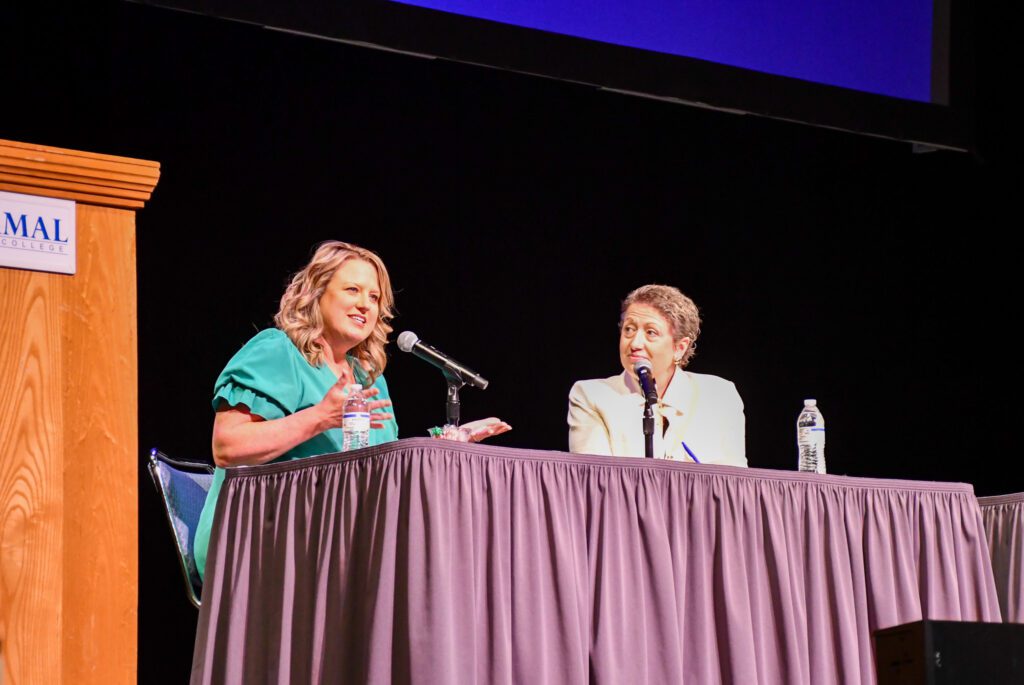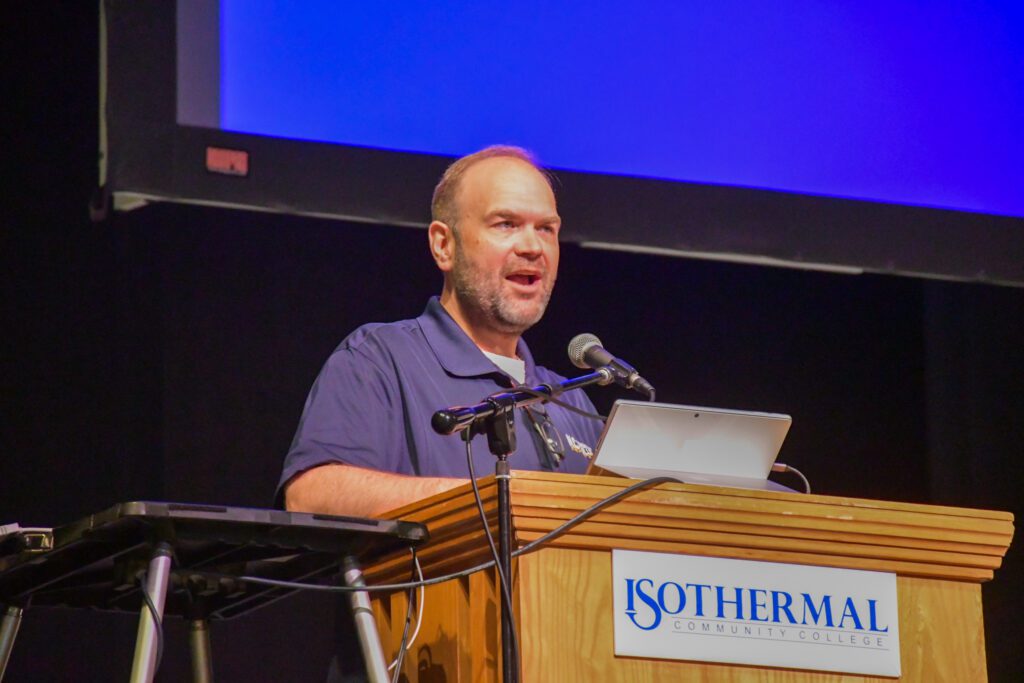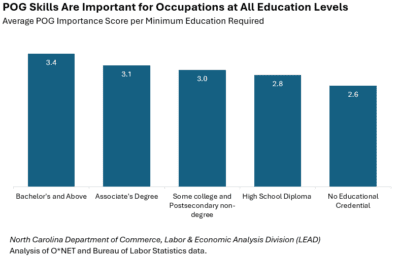
|
|
On Monday, July 15, Isothermal Community College (ICC), the Belk Center for Community College Leadership and Research, the North Carolina Community College System (NCCCS), and the North Carolina Student Success Center (NC SSC) hosted a one-day workshop to share lessons learned about ICC’s transition to an eight-week course format. Representatives from 14 North Carolina community colleges and one Wyoming community college attended the inaugural event.
“Hosting a one-day workshop was vital for us because we wanted to share the knowledge and insights we’ve gained through our experience with eight-week courses with our sister colleges,” said Dr. Greg Thomas, vice president for academic and student affairs at ICC. “We believe in the power of collaboration and wanted to give back in the same way so many of these institutions have done with us in the past as they have shared their wisdom on various topics.”
From 16 weeks to eight
Colleges have long debated the structure of academic calendars. From the quarter system to semesters, it’s a conversation that spans decades. In recent years, community colleges have been reevaluating course delivery, with some moving from a traditional 16-week semester to an eight-week course format.
In fall 2023, ICC transitioned most of the college’s courses to an eight-week format. Fall and spring semesters include two eight-week terms and most summer courses are offered in an eight-week format.
“ICC’s decision to move to a primarily eight-week course format was an intentional effort to better support successful outcomes for all students,” said Dr. Margaret Annunziata, president of ICC.
During a traditional 16-week semester, students complete on average 12-18 credit hours or four to five courses at a time. The shift to an eight-week format allows students to complete 6-9 credit hours per eight-week term or two to three courses at a time.
View ICC’s eight-week student handbook here.



A growing body of research suggests that changing the semester structure gives students “more flexibility and more continuous on-ramps.” According to Achieving the Dream’s (ATD) shortened academic terms guide, deconstructing the academic term helps support students and can accelerate them toward a credential of value. Offering two terms in an academic semester “allows students at least five opportunities to enroll in courses over a calendar year and to focus on fewer courses at a time.”
That’s huge for community college students who, more often than not, are juggling work, families, and a host of other responsibilities in addition to school.
“This design provides more on-ramps to a new or enhanced career, allowing students to get started in their educational program on a timeframe that is more closely aligned with their needs and interests.”
Dr. Margaret Annunziata, president of Isothermal Community College
What does the data show?
Almost a year’s worth of data from ICC reveal both headcount and success rates are up.
From fall 2022 to fall 2023, ICC’s curriculum headcount increased nearly 4.5% – making it the college’s highest headcount since fall 2019. In spring 2024, headcount increased 7.6% from the previous spring semester according to ICC.
The college’s student success rate – defined as students who complete courses with a “C” or higher – increased to 86% in fall 2023, a 7% jump from the previous fall semester.
“Ultimately, this transformation has resulted in more students enrolling in more courses in their career pathways and experiencing more success than previously experienced in the 16-week format,” Annunziata said. “While it is early data, it is encouraging to see that through this work, we truly are expanding opportunity and impact for our students and the communities we serve.”
In fall 2023, ICC’s student satisfaction survey revealed that 76.5% of students were in favor of the eight-week course format. In spring 2024, 78.9% of students found it favorable. Students felt the hard work required of the eight-week format was worth it to finish courses earlier, the workload and course content in their respective courses was manageable, and they learned as much in the eight-week course as they would have in a 16-week course.
ICC’s metrics are on par with ATD’s research, which included data from five community colleges across the country that shifted to shorter terms.



Lessons learned
The one-day workshop was an opportunity for ICC leaders from various departments to share lessons learned, challenges, and opportunities about shifting most courses to an eight-week format. Attendees were asked to identify topics and areas they most wanted to learn about prior to the workshop and during.
“Bringing colleagues to our campus was crucial because it allowed us to involve all of our ‘boots on the ground’ team members in the discussions. While our administrative leadership team has presented on our ‘Be Great in 8’ efforts numerous times and will likely do so again, we felt the most meaningful experience for other colleges would come from hearing directly from the individuals who made our change effective through their hard work and dedication in their respective roles.”
Dr. Greg Thomas, vice president for academic and student affairs at Isothermal Community College
Transitioning to a primarily eight-week format impacts the whole college, Thomas said. And the transition is time intensive and requires a lot of planning, preparation, and communication.
In his opening remarks, Thomas reminded attendees to remember their “why” when they hit roadblocks during the shift and to practice active listening when discussing how an eight-week format impacts each college department.
“If you encourage people to talk, then you get more feedback,” Thomas said. “And more feedback equals a better product.”
Leeann Cline-Burris, ICC’s director of institutional effectiveness and strategic analysis, recommended several strategies for how colleges can share data internally. Some of those strategies included defining clear key performance indicators, regular reporting and feedback loops, disaggregating data, benchmarks, transparency, continuous evaluation and contextualization, and celebrating wins throughout the transition process.
During the shift to an eight-week format, ICC offered institutional support of professional development for faculty who were tasked with moving their class content to an eight-week format. One of those supports included a course redesign academy for faculty through the ICC’s Teaching and Learning Center. Faculty were not required to complete the academy but those who did received a stipend.



Attendees heard from several ICC department leaders throughout the day about the work involved in moving to an eight-week format. Those departments included advising, student records, financial aid, the business office, Career and College Promise, and faculty from various academic areas.
Leaders discussed what academic scheduling looks like from the college and student perspectives. Topics also included how ICC handled awarding financial aid and disbursements and the impact shortened semesters had on student records, particularly as it relates to students withdrawing from courses.
After the plenary sessions, attendees were separated into three groups — academic affairs, student affairs, and faculty — to discuss what they had learned in the previous sessions while being guided by an ICC leader in each area. The groups were then tasked with developing questions that were not answered during the sessions or break-out groups for a final question and answer discussion.
If your college missed the one-day workshop, more detailed learnings will be provided by the Belk Center at a later date. Additionally, the Belk Center and ICC plan to continue their support of other colleges as they transition to an eight-week course format.





